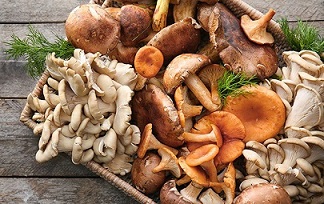Health News - Mushrooms - Hypertension May 13, 2023 1 year, 10 months, 2 weeks, 5 days, 2 hours, 38 minutes ago
Health News: As health consciousness rises globally, the search for functional foods - those that offer benefits beyond basic nutrition, has never been more intense. Emerging from the shadows of this search are the humble, yet power-packed, edible mushrooms. Rich in nutritional bioactive constituents, mushrooms influence cardiovascular function and are gaining recognition for their role in managing hypertension - a major global health concern.
 The Silent Killer: Hypertension
The Silent Killer: Hypertension
Hypertension, often known as the silent killer, is a chronic, modifiable, and multifactorial condition associated with increased arterial blood pressure. It is one of the significant risk factors for heart diseases and a global health emergency. According to the National Health and Nutrition Examination Surveys, hypertension is defined as a systolic blood pressure equal to or greater than 140 mmHg and/or a diastolic blood pressure equal to or greater than 90 mmHg. If left unchecked, hypertension can lead to serious pathological conditions such as stroke, cardiovascular diseases (CVDs), heart failure, and hypertensive cardiomyopathy.
The ‘Therapeutic’ Mushrooms
Edible mushrooms, boasting a plethora of bioactive constituents, are regarded as potential functional foods for managing chronic ailments, including hypertension.
Fungi like Agaricus bisporus, Lentinula edodes, and Chanterelle cibarius are rich in compounds such as cordycepin, ergosterol, chitosan, mannitols, β-glucans, tocopherols, indoles, and ergothioneine, all of which are associated with positive effects on heart function.
One standout compound, ergosterol, undergoes photolysis to produce various metabolites of vitamin D, which regulates calcium levels in the body. A reduction in vitamin D levels has been linked with an elevated risk of hypertension, emphasizing the importance of maintaining this vitamin through our diet as covered in previous
Health News reports.
Lovastatin, a bioactive compound found in mushrooms, transforms enzymatically to hydroxy acid, which inhibits the conversion of HMG-CoA to mevalonic acid, leading to a reduction in cholesterol levels, a crucial step in managing hypertension.
Chitosan, another mushroom compound, can reduce LDL cholesterol and triglyceride levels in the blood, further contributing to heart health.
Moreover, various in vivo and in vitro studies have revealed that γ-aminobutyric acid (GABA) antagonists can lower blood pressure and slow heart rate through activation of GABA-receptors in cardiovascular tissues. With their rich content of these beneficial compounds, mushrooms have emerged as a potential dietary intervention for managing hypertension.
Moreover, mushrooms harbor an array of other beneficial compounds. Tocopherols, derived from the Craterellus cornucopioides mushroom, have been linked to enhancing heart function.
While mushrooms may not replace antihypertensive drug treatment, they can potentially serve as a prophylactic measure. The regular intake of mushrooms may help prevent or manage hypertension, but this claim requires additional supporting studies
. There is also a need for more research into the role of mushroom polysaccharides like D-mannitol in modulating cholesterol biosynthesis and absorption
Towards A Heart-Healthy Diet
Mushrooms are frequently incorporated into various heart-healthy diets, such as the Dietary Approaches to Stop Hypertension (DASH) and Mediterranean diets, due to their rich nutritional profile and potential health benefits. These bioactive compounds derived from mushrooms, such as lovastatin, cordycepin, ergosterol, and eritadenine, influence gene expression that induces cardiovascular functionalities. This is due to their structural similarities with adenosine or cholesterol moieties, making them potential drug candidates to reduce hypertension.
Conclusion
While mushrooms offer a multitude of benefits, they are not intended to replace antihypertensive drug treatment. Instead, the dietary intake of mushrooms could serve as a preventative measure, a natural addition to treatment regimens, enhancing overall health and fortifying the body against hypertension.
The realm of edible mushrooms is a treasure trove of potential solutions for hypertension. The synergy between vasorelaxation, cholesterol biosynthesis, and fibrinolytic systems could offer a holistic, more natural approach towards preventing and managing this widespread condition.
The future of mushrooms in the context of hypertension is promising, yet it's still in its infancy, needing more exploration and understanding. The complex biological processes and interactions at play demand further studies to untangle the intricate web of cause and effect. Nevertheless, the potential is undeniable, offering a tantalizing glimpse into a future where food and medicine intertwine more closely than ever before, leading to a new era of personalized, nutrition-based healthcare.
So, next time you enjoy a delicious mushroom dish, remember, you're not only savoring a culinary delight but also embracing a powerful ally in maintaining your heart's health. The humble mushroom, it appears, is anything but ordinary. It’s a silent superhero, a testament to nature's remarkable capacity for healing and protection. Whether in the form of a hearty mushroom soup, a delicate risotto, or a robust stir-fry, these fungal wonders are sure to play a starring role in the saga of human health.
Reference: Edible mushrooms as potential functional foods in amelioration of hypertension.
Abdur Rauf, Payal B. Joshi, Zubair Ahmad, Hassan A. Hemeg, Ahmed Olatunde, Saima Naz, Nabia Hafeez, Jesus Simal-Gandara
Phytotherapy Research, 8th May 2023
https://onlinelibrary.wiley.com/doi/10.1002/ptr.7865
For the latest
Health News, keep on logging to Thailand Medical News.
